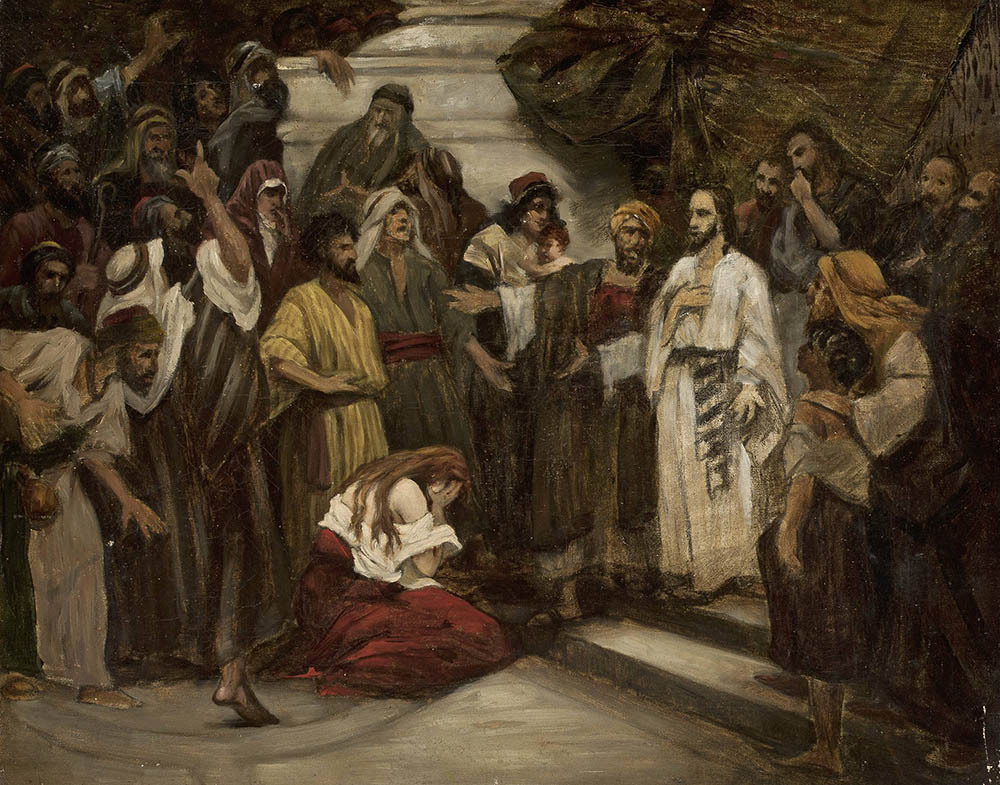
First Reading Isaiah 43:16-21
The Lord is doing something new for his people.
Responsorial Psalm Psalm 126:1-6
A song in praise of the Lord's marvelous deeds
Second Reading Philippians 3:8-14
Paul says that he counts all things as lot and focuses on one goal, Christ.
Gospel Reading
John 8:1-11
Jesus does not condemn the woman caught in adultery.
Background on the Gospel Reading
The Gospel for the fifth Sunday of Lent continues to offer lessons about God's mercy and forgiveness. Last Sunday we heard the Parable of the Prodigal Son from the Gospel of Luke. Today we hear not a parable, but the report from John's Gospel of an encounter among Jesus, the scribes and Pharisees, and a woman caught in adultery.
In John's Gospel, the conflict between Jesus and the scribes and Pharisees occurs much earlier than in the Synoptic Gospels. Jesus' cleansing of the Temple in Jerusalem is reported at the beginning of John's Gospel. Even after this event, Jesus continues to teach in the Temple. After returning to Galilee for a time, Jesus again enters Jerusalem and cures a man on the Sabbath. From this point forward in John's Gospel, the Pharisees are described as making plans for Jesus' arrest and seeking his death.
In the chapter preceding today's Gospel, Jesus was teaching in the Temple area. Feeling threatened by his teaching and his actions, the chief priests and the Pharisees are already sending guards to arrest Jesus. The guards return, however, without arresting Jesus because they have been impressed by his words. Even more than this, some among the crowds are considering the possibility that Jesus is the Messiah. The chief priests and the Pharisees change their plan. Before making an arrest, they seek to gather more evidence against Jesus by posing a question intended to trap Jesus.
Today's Gospel begins by reporting that Jesus is again teaching the crowds in the vicinity of the Temple. The scribes and the Pharisees approach Jesus, bringing a woman who has been caught in the act of adultery. They put to Jesus the question of what ought to be done in this case.
The Pharisees state clearly that according to the Law of Moses, those caught in the act of adultery were to be stoned to death. Under Roman occupation, however, the Jewish people did not have the authority to execute people; this is cited in John's passion narrative. To answer the Pharisees' question, Jesus must propose an action that will be either contrary to the Law of Moses or contrary to Roman law. The purpose of the question appears to be similar to the question about paying taxes found in Mark 12:13-17. Either answer, yes or no, will support the Pharisees' case against Jesus.
Jesus avoids the trap, however, by offering an answer that was not anticipated by those who posed the question. Jesus, after writing on the ground with his finger, addresses those who stand before him and suggests that the one without sin cast the first stone. Jesus then returns to his writing. This Scripture reading, by the way, is the only evidence we have of Jesus writing. Yet there are no specific details about what he wrote.
We can easily imagine the scene as the Pharisees and the elders disperse, one by one. Jesus has eluded the trap they had prepared. We might also give credit to the elders and the Pharisees who do not, in the end, claim to be sinless and worthy of passing judgment. These Pharisees are not as self-righteous as the portrait found in the parable of the pharisee and the tax collector (See Luke 18:9-14).
Left alone with the woman, Jesus asks where the accusers have gone. With no one remaining to condemn the woman, Jesus (the one who truly is without sin) sends the woman on her way, refusing to pass judgment on her and exhorting her to avoid future sin.
Jesus' response to those who accuse the woman is more than a caution to us about making judgment of others. It is a profound lesson in divine mercy and forgiveness. As sinners, we are all unworthy to judge the sins of others and we would stand convicted by God for our transgressions. Yet Jesus, the one without sin and thus our judge, offers us who are sinners his mercy and forgiveness. Redeemed by Jesus' compassion, we are sent to sin no more and to live in God's love and peace.
No comments yet. Be the first to say something!